The White Haired Witch of Lunar Kingdom
白发魔女传之明月天国
China/Hong Kong, 2014, colour, 2.35:1, 3-D, 103 mins.
Director: Zhang Zhiliang 张之亮 [Jacob Cheung].
Rating: 7/10.
Latest version of the story is decent but emotionally underwhelming.
Wudang Mountains, Hubei province, northern China, AD 1620. During the final years of the Ming dynasty, Zhuo Yihang (Huang Xiaoming), a champion disciple of the Wudang Sect, is instructed by his master to take two special red pills to the imperial court in Beijing to help save the ill Taichang Emperor, the new ruler. En route, he passes by the Yellow Dragon Cave, where he meets a mysterious demoness (Fan Bingbing); he is attracted to her but she has foresworn love and sends him packing. In Beijing the pills are accepted on the emporor’s behalf by Wei Zhongxian (Ni Dahong), the chief eunuch, who switches them for some poisoned ones. After the death of the Taichang emperor, his young son becomes the Tianqi Emperor, dominated by Wei Zhongxian, who blames Zhao Yihang for the assassination and sends a squad of jinyiwei 锦衣卫 (military secret police) after him. Meanwhile, a fort commanded by Zhao Yihang’s grandfather, Zhuo Zhonglian (Hu Xiaoguang), governor-general of Sichuan and Shaanxi, is attacked by a group of vigilante bandits led by Jade Demon (Fan Bingbing) and her sister-in-arms Iron Coral (Li Xinru). During the fighting, Zhuo Zhonglian’s deputy, local Jin clan member Jin Duyi (Zhao  Wenzhuo), secretly kills his superior and blames it on the bandits. Charged with finding Zhuo Zhonglian’s killer, Jin Duyi orders Mingyue Gorge, where the bandits live, to be sealed off and Jade Demon to be arrested. However, she escapes, along with Zhao Yihang, who is in the area, and army captain Murong Chong (Wang Xuebing), who is sympathetic to her attempts to help some starving locals who have contracted typhoid. They flee to the bandits’ hideout in the Mingyue Mountains, where Zhao Yihang, who has medical training, offers to cure the sick. The mountains occupy a crucial military location, protecting the central plains of China; beyond them are Manchu forces led by Aixinjuelo Hong Taiji (Yan Yikuan) that are intent on conquering the weak Ming dynasty. Yihang is successful in curing the typhoid and later makes love on a mountain top with Jade Demon, whom he has renamed Lian Nishang. When the jinyiwei penetrate the mountain hideout, and demand that Zhao Yihang comes back to Beijing to stand trial, he only agrees when he’s told Lian Nishang was responsible for his grandfather’s death. She denies it, and he asks her to wait for him while he solves the mystery to his own satisfaction. While Zhao Yihang is in the capital, plotting an elaborate revenge on Wei Zhongxian that involves marrying his daughter Ke Pingting (Tong Yao), Lian Nishang unexpectedly arrives to catch the two together. Devastated by Zhao Yihang’s apparent betrayal, she is wounded in a fight and her hair turns white. Zhao Yihang carries her back, unconscious, to her mountain hideout.
Wenzhuo), secretly kills his superior and blames it on the bandits. Charged with finding Zhuo Zhonglian’s killer, Jin Duyi orders Mingyue Gorge, where the bandits live, to be sealed off and Jade Demon to be arrested. However, she escapes, along with Zhao Yihang, who is in the area, and army captain Murong Chong (Wang Xuebing), who is sympathetic to her attempts to help some starving locals who have contracted typhoid. They flee to the bandits’ hideout in the Mingyue Mountains, where Zhao Yihang, who has medical training, offers to cure the sick. The mountains occupy a crucial military location, protecting the central plains of China; beyond them are Manchu forces led by Aixinjuelo Hong Taiji (Yan Yikuan) that are intent on conquering the weak Ming dynasty. Yihang is successful in curing the typhoid and later makes love on a mountain top with Jade Demon, whom he has renamed Lian Nishang. When the jinyiwei penetrate the mountain hideout, and demand that Zhao Yihang comes back to Beijing to stand trial, he only agrees when he’s told Lian Nishang was responsible for his grandfather’s death. She denies it, and he asks her to wait for him while he solves the mystery to his own satisfaction. While Zhao Yihang is in the capital, plotting an elaborate revenge on Wei Zhongxian that involves marrying his daughter Ke Pingting (Tong Yao), Lian Nishang unexpectedly arrives to catch the two together. Devastated by Zhao Yihang’s apparent betrayal, she is wounded in a fight and her hair turns white. Zhao Yihang carries her back, unconscious, to her mountain hideout.
REVIEW
Beautifully packaged on a visual level, and with a strong Mainland cast down the line, The White Haired Witch of Lunar Kingdom 白发魔女传之明月天国 has everything going for it except a strong central love story. Funded, written and cast by China money and talent, but largely made by Hong Kong key crew, this fourth film version of one of the most famous martial arts novels by the late Liang Yusheng 梁羽生 – 白发魔女传, originally serialised in 1957-58 – makes a brave stab at distilling the complicated plot down to feature length and has two charismatic performers in the lead roles. But on a dramatic level, while always remaining decent, it hardly ever catches fire for more than a few minutes at a time, and signally fails to elevate the central love story (between a demoness bandit and a Daoist monk) into one of mythic proportions.
The most memorable film version of Liang’s tale is The Bride with White Hair 白发魔女传 (1993), directed by Yu Rentai 于仁泰 [Ronny Yu], which threw out 90% of the plot and came up with an extravagantly operatic tone poem of tragic love. Combining the power of the photography by Bao Dexi 鲍德熹 [Peter Pau], art direction by Ma Panchao 马盘超 [Eddie Ma], costumes by Wada Emi 和田惠美, and the star teaming of Lin Qingxia 林青霞 [Brigitte Lin] and the late Zhang Guorong 张国荣 [Leslie Cheung], it was a jaw-dropping demonstration of Hong Kong cinema’s power of the time. Twenty years later, the landscape has changed: while still shifting stuff around and omitting large chunks, Witch‘s five Mainland scriptwriters (who include Zhu Yali 朱雅欐 from Flying Swords of Dragon Gate 龙门飞甲, 2011, and Guo Junli 郭俊立 from Let the Bullets Fly 让子弹飞, 2010) take a more faithful approach to Liang’s novel, restoring much of its historical and political background (set just prior to that of the recent Brotherhood of Blades 绣春刀, 2014). Structurally, they still have problems trying to incorporate so much detail into a relatively short running time; but for Chinese audiences at least, fidelity to the original plot isn’t that important: anyone wanting more literal versions of martial arts novels can watch the multi-episode TV versions (five of which exist for Liang’s novel). For local audiences, the main point of movie versions is their extra star power and bigger production values – and both of those Witch delivers in spades.
The diva persona and porcelain beauty of Fan Bingbing 范冰冰 make her ideal casting for the title role of a demoness-cum-people’s-bandit who’s forsworn love; and here, with her kohl-eyed make-up and flowing white hair, she does a serviceable job. The problem is that she doesn’t dominate the movie in the way she should, partly because her co-star, Huang Xiaoming 黄晓明 (An Inaccurate Memoir 匹夫, 2012; American Dreams in China 中国合伙人, 2013), is even more charismatic on a screen level and, with more of the political background included this time round, has more time to draw an involving character. Fan has never been great on developing much chemistry with her co-stars, but here she and Huang entertainingly try to outdo each other in flashing-eyed looks. Alas, whenever they start to generate some kind of emotional complicity, the film quickly cuts away to another part of the story.
Huang interacts with a powerful male cast, including Zhao Wenzhuo 赵文卓 in one of his best performances as a traitorous general, veteran Ni Dahong 倪大红 as the famously evil court eunuch Wei Zhongxian, and, though he’s only fitfully integrated into the story, Wang Xuebing 王学兵 as a likeable army captain. Among the female supports, Tong Yao 童瑶 (Snowfall in Taipei 台北飘雪, 2009) manages in only a few scenes to etch a sympathetic character as Wei Zhongxian’s daughter, the victim of a larger revenge story.
Apart from the bitty script, the main reason why White Haired Witch doesn’t exert much emotional hold is largely due to the direction by Hong Kong’s Zhang Zhiliang 张之亮 [Jacob Cheung]. Not naturally at home in costume drama, Zhang still acquitted himself well in his two previous excursions into the genre (Last Eunuch in China 中国最后一个太监, 1988; Battle of Wits 墨攻, 2006), and the more realistic sections of Witch work fine within their limitations. The problem is the story’s more fantastical side – an area in which Zhang has never been comfortable – on which the central love story relies for its power: there’s a consistent reluctance to let the love story soar, to go with the flow, and the melodious but restrained scoring by Jin Peida 金培达 [Peter Kam] is equally to blame here, with little sweep or true passion. When Zhang Guorong’s Cantonese song, The White-Haired Beauty 红颜白发, is plastered over the finale and end titles, it’s almost an admission of failure – that the legacy of Yu’s movie and Zhang’s identification with it are too powerful not to reference.
To their credit, visual effects remain in the service of the narrative, without overpowering the performances, and action scenes, staged by Hong Kong veteran Dong Wei 董玮, are okay. With a further half-hour’s running time, and the right director, Witch could have been a definitive version for the modern era. Instead, it’s just a decent one that’s always a notch down on its potential.
CREDITS
Presented by Bona Film Group (CN), Omnijoi Media (CN), Youku Tudou (CN), Wanda Media (CN), Bona Entertainment (HK). Produced by Bona Film Group (CN), Omnijoi Media (CN), Youku Tudou (CN), Wanda Media (CN), Bona Entertainment (HK).
Script: Kang Qiao, Wang Bing, Zhu Yali, Shi Heran, Guo Junli. Photography: Lin Guohua [Ardy Lam]. Novel: Liang Yusheng. Editing: Kuang Zhiliang. Music: Jin Peida [Peter Kam]. Art direction: Wu Jiakui. Costume design: Ye Jintian [Timothy Yip]. Sound: Yang Jingyi, Wang Danrong. Action: Dong Wei. Visual effects: Zheng Yaoming (3 Plus Animation Production). Artistic consultation: Xu Ke [Tsui Hark]. 3-D supervision: John Troy, James He (Cubic Pictures).
Cast: Fan Bingbing (Yu Luocha/Jade Demon/Lian Nishang), Huang Xiaoming (Zhuo Yihang), Zhao Wenzhuo (Jin Duyi, deputy general), Wang Xuebing (Murong Chong, chief constable), Ni Dahong (Wei Zhongxian, chief eunuch), Tong Yao (Ke Pingting, Wei Zhongxian’s daughter), Li Xinru (Tie Shanhu/Iron Coral), Ye Tong [Cecilia Yip] (Ling Muhua), Yan Yikuan (Aixinjuelo Hong Taiji, Manchu general), Yu Chenghui (Ziyang), Dong Ziwu (Xu, eunuch), Xu Xiangdong (Bai Shi), Xue Jian (Huang Ye), Sun Jiankui (Hong Yun), Hu Xiaoguang (Zhuo Zhonglian, governor-general, Zhuo Yihang’s grandfather), Wang Yachao (Murong Chong’s assistant), Li Hua (Zhu Changluo, Taichang Emperor), Wang Yiming (Zhu Youxiao, Tianqi Emperor), Liu Dian (head of jinyiwei military secret police), Wang Deshun (head of Mingyue Fort/Fort Luna), Li Yixuan (Fei Honglin), Yin Zhusheng (Xiong Tingbi), Xiao Rongsheng (Yuan Chonghuan).
Release: China, 31 Jul 2014; Hong Kong, 31 Jul 2014.
(Review originally published on Film Business Asia, 6 Oct 2014.)
